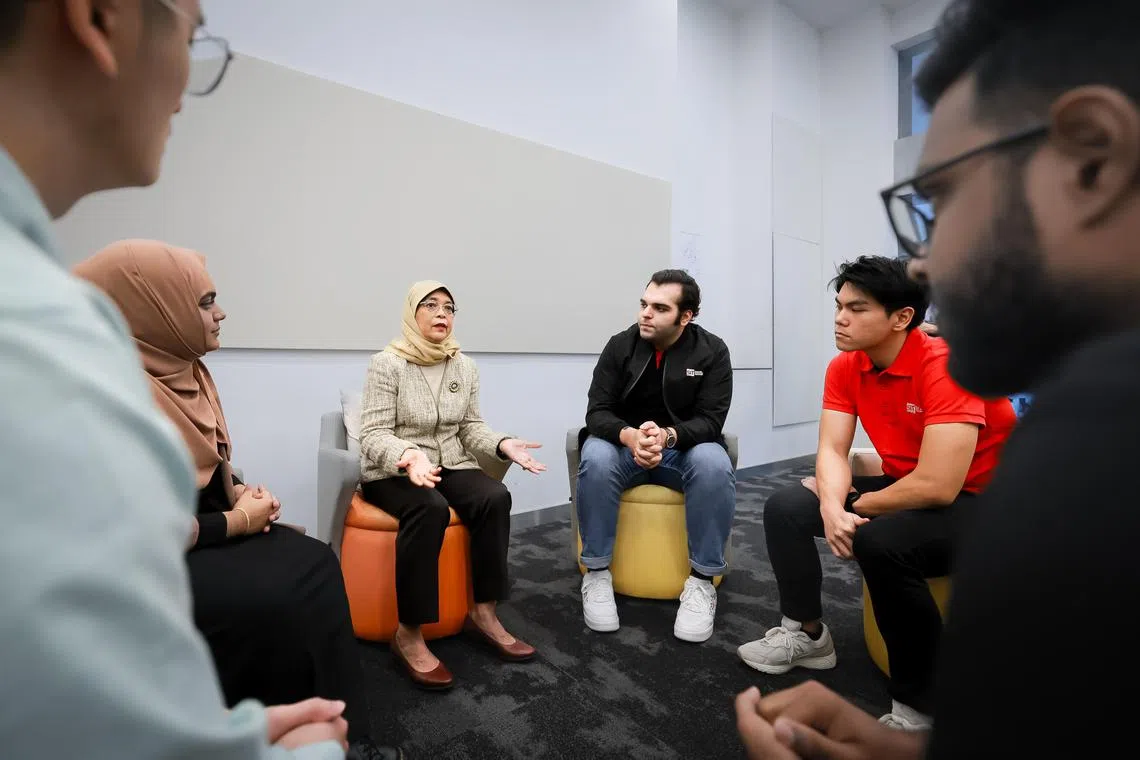More mental health support for SIT students amid increasing number seeking help
Sign up now: Get tips on how to help your child succeed

President Halimah Yacob (third from left) interacting with Singapore Institute of Technology students during a visit to its Dover campus on June 28.
ST PHOTO: GAVIN FOO
Follow topic:
SINGAPORE - The Singapore Institute of Technology (SIT) is channelling more resources towards supporting students’ well-being, as more of its students have come forward to seek help for mental health issues in recent years, it said.
Its initiatives include recruiting peer supporters and getting students and staff to complete a short online module on mental health.
Since 2022, the institution has trained some 150 students as peer supporters, and aims to grow this to 600 by the academic year 2025. It is also looking to have a pool of 1,600 student leaders – who cover a broader range of activities, including well-being and social cohesion – by that time.
Other plans include an optional mental health screening for students for early identification and intervention, starting in 2024, and the use of a mobile application for students to reach out to peer supporters.
From the academic year 2023, all students and staff will be required to take a short module or workshop on mental health.
When asked, SIT did not provide figures for how many students have sought help for mental health issues in recent years.
President Halimah Yacob on Wednesday visited SIT’s Dover campus, where she interacted with several groups of students and was briefed on the university’s mental health efforts.
Since 2020, the university has held Wellness Week activities twice a year to raise awareness about mental health, positive coping mechanisms for stress, and the sharing of resources to cope with such issues.
SIT deputy president (academic) and provost John Thong said that common mental health issues among youth include coping with “personal challenges as they navigate through adulthood”, “loneliness as digital natives” and “anxiety that comes with the pressure to do well and succeed”.
He added: “(It starts with noticing) that students are missing in class... we try to keep as many eyes on students as possible. We check in on students and, in many cases, there are many challenges – some of it could be financial, especially post-Covid, some of it is to do with anxiety.”
Peer supporters, who are spread across SIT’s five academic clusters, act as an expanded safety net, said Professor Thong, who added that students may be more willing to seek help as they are more comfortable talking to their peers.
The peers, who volunteer for the role, are trained by external specialists in understanding mental health challenges and conditions, as well as in providing interim support.
They can also help to refer fellow students for professional intervention.
Students have access to counsellors both on campus and online. If necessary, they may also be referred to a panel of mental health specialists for further assessment and support.
SIT third-year occupational therapy student Amy Wong, 28, who signed up to be a peer supporter in 2022, said: “I noticed that peers in my cohort were quite stressed, but there wasn’t enough support (for them).
“People are aware of counselling, but there’s always that stigma that stops them from seeking professional help. As peer supporters, we identify peers who may require such support and try to be present for them as much as we can, and, when necessary, we suggest interventions that might be beneficial for them.”
She finds purpose in being part of the first line of defence in mental health efforts. “I believe in a preventive rather than reactive approach... It’s easier to catch people early before their problems escalate,” she said.
SIT students also reach out to youth beyond its campuses.
Second-year accountancy student Santhny Ramani, 23, was part of a student group that organised monthly activities and weekly befriending sessions with secondary school students.
“During my secondary school years, there wasn’t much help besides (that from) teachers and counsellors... Having someone to talk to in your teenage years is really crucial,” she said.
“When you have someone with you on this journey, it makes a big difference.”


